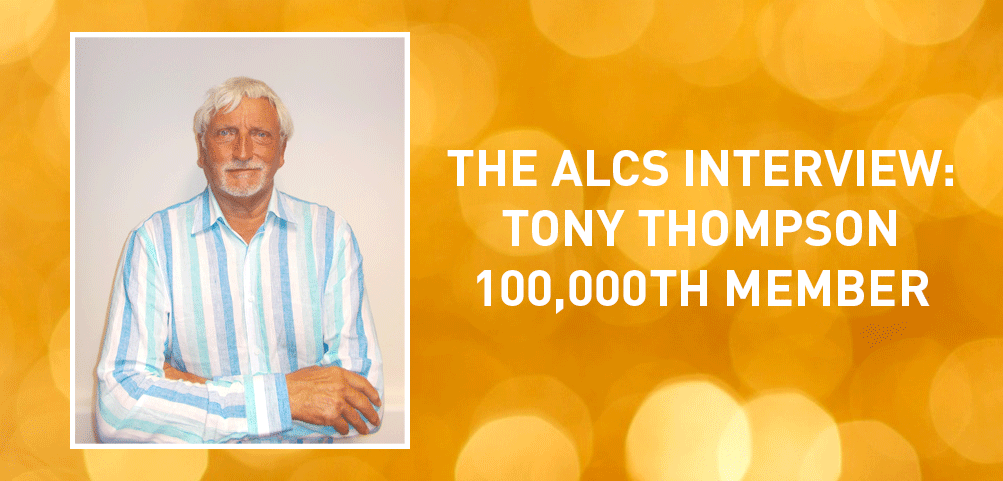
THE ALCS INTERVIEW: TONY THOMPSON, OUR 100,000th MEMBER!
By the end of 2018, ALCS hit its strategic target of 100,000 Members. To mark the occasion, Caroline Sanderson talked to milestone Member number 100,000: Tony Thompson, a leading practitioner in the field of mental health nursing.
“I wish I had the same luck on things like the lottery!” responds Tony Thompson when I congratulate him on being ALCS’ 100,000th member.
Tony is an interesting and instructive example of an author whose career as a writer has derived from his professional work, but has also complemented and enhanced it. Originally from Hull and now based in Liverpool, Tony trained as a psychiatric nurse after a spell in the RAF when he left school, and then as a mental health nurse, working for a time at the high security Rampton Hospital in Nottinghamshire. “I became a nursing officer at a very young age and was seconded to become a nurse tutor. I then did a Bachelor degree in Education and subsequently went on to do a Masters in Social Policy and Administration.”
I became an advisor for mental health at a national level and I still undertake serious incident investigations on behalf of the NHS as part of their framework on homicides and suicides. I get much of this work by reputation, and that reputation came from my publishing.
Now the co-author and editor of several publications, Tony’s first book came about because there was a lack of good teaching within the training of mental health nursing about how to collaborate effectively with colleagues in other professions, especially social workers. “The existing training was geared either to general nursing or general social work. And yet out in the field, people had to find ways of working together because of the nature of the issues involved, particularly with community care.”
After the General Nursing Council got together with the Social Work Council to find a solution, Tony – considered at the time to be “quite a creative nurse teacher”, as he puts it – was paired with an equally creative occupational psychologist named Dr Peter Mathias. It was the start of a long and fruitful collaboration as co-authors and editors of a whole series of text books, as well as a firm personal friendship.
Published in 1998, Tony’s first book with Peter Mathias was a ground-breaking text for the teaching of learning disability nurses, and it is still the standard text. Entitled Standards and Learning Disability, it was quickly hailed as “an innovative approach to the discussion of interprofessional standards and competencies” in the complex field of caring for people with mental health and learning disabilities. Apart from a nursing dictionary, it was the biggest selling nursing text book that year, shifting around 26,000 copies.
ALCS is a good cause. It gives people an identity, connecting writers across many different genres who’ve all got one thing in common: they’re all motivated to write something down, which hopefully will stimulate someone else!
Tony and Peter Mathias went on to write and edit several more books, including Interprofessional Working for Health and Social Care with John Øvretveit (currently Tony’s highest-earning book in terms of ALCS secondary royalties). These publications helped enhance both his own professional reputation and those of his contributors too. “We brought people in to write chapters for our books who were doing really good work but who weren’t part of the nursing or social work hierarchy so wouldn’t otherwise have got any recognition. Some of them have gone on to be professors; some have gone on to write their own books. It was wonderful to see really. And it also projected me into a different world as well. I became an advisor for mental health at a national level and I still undertake serious incident investigations on behalf of the NHS as part of their framework on homicides and suicides. I get much of this work by reputation, and that reputation came from my publishing.” Though now technically retired, recent work has taken Tony to New York and to the United Nations where the International Council of Caring Communities is based.
Tony admits he had been receiving communications from ALCS about the fact that he was due secondary royalties for a couple of years without responding. What finally convinced him to do so was the realisation that his text books – written a decade or more ago – were still widely in use. “It was only recently when I was undertaking an investigation on behalf of the NHS that I bumped into someone who said: ‘oh yes we still use your original text – we use photocopies of it when we’re training’. So that’s when I thought: okay, I will fill this ALCS form in and send it off – I’ve got nothing to lose.”
Now delighted to be an ALCS member, Tony confesses himself surprised that “in this digital age, people are still photocopying a lot of the original stuff from the four or five books that we did. And that people want to respect the energies that go into writing this stuff”.
Our 100,000th member concludes: “ALCS is a good cause. It gives people an identity, connecting writers across many different genres who’ve all got one thing in common: they’re all motivated to write something down, which hopefully will stimulate someone else!”
Interview by Caroline Sanderson, author, freelance books journalist and editor of ALCS News.
